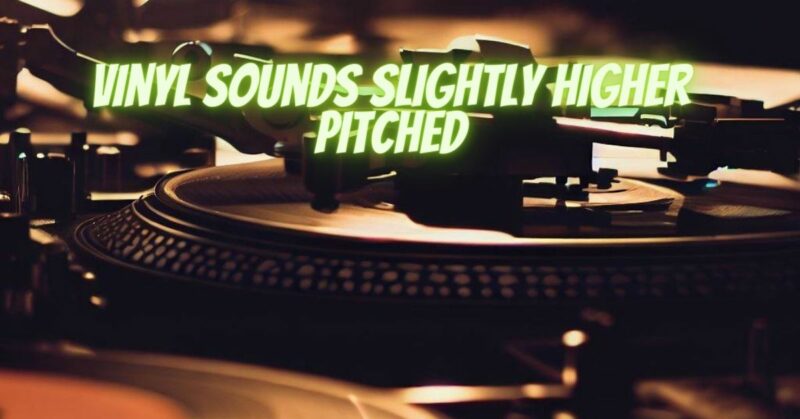Listening to vinyl records is a unique and cherished experience for many audiophiles and music enthusiasts. However, vinyl records can sometimes present playback issues that affect the sound quality, and one common problem is when vinyl sounds slightly higher-pitched than it should. This issue can detract from the enjoyable listening experience. In this article, we will explore the causes of this problem and provide practical solutions to help you resolve it and restore the correct playback pitch for your vinyl collection.
Understanding Pitch in Vinyl Playback
Pitch in vinyl playback refers to the perceived frequency of sound. On a properly functioning turntable, vinyl records should play at the correct pitch, ensuring that you hear the music as the artist intended it. The most common rotational speeds for vinyl records are 33⅓ RPM (revolutions per minute) for LPs (long-playing) and 45 RPM for singles. Playing records at the incorrect speed can cause the pitch to deviate from the original, distorting the sound.
Causes of Slightly Higher-Pitched Vinyl Playback
- Incorrect Turntable Speed Setting: One of the most common reasons for slightly higher-pitched playback is the incorrect setting of the turntable’s rotational speed. If your turntable is set to the wrong speed, it will affect the pitch of the music.
- Dirty or Worn Stylus: The stylus (needle) on your turntable’s tonearm is responsible for tracking the grooves on the vinyl record. A dirty or worn stylus can cause misalignment and result in higher-pitched playback.
- Motor Issues: The turntable’s motor plays a crucial role in maintaining consistent rotation. Motor problems, such as fluctuations in speed, can cause pitch deviations.
- Belt Drive Problems: Turntables with belt drive systems rely on a belt to transmit power from the motor to the platter. If the belt is loose, stretched, or damaged, it can affect the rotation speed and pitch.
- Record Manufacturing Defects: In rare cases, the vinyl record itself may have manufacturing defects that cause variations in pitch.
Solutions to Correct Slightly Higher-Pitched Vinyl Playback
- Verify Turntable Speed: Double-check that your turntable’s speed setting matches the recommended speed for the type of record you are playing (e.g., 33⅓ RPM or 45 RPM). Many turntables have a pitch control feature that allows for minor speed adjustments.
- Stylus Maintenance: Regularly clean and inspect your stylus for dirt or wear. Replace it if necessary, following the manufacturer’s guidelines, to ensure proper tracking and pitch accuracy.
- Motor Maintenance: If you suspect motor issues, consult your turntable’s manual for guidance on motor maintenance. Professional repair may be necessary if the motor is malfunctioning.
- Belt Replacement: If your turntable uses a belt drive system, check the condition of the belt. Replace it if it’s worn, stretched, or damaged, as this can affect pitch.
- Inspect Records: Examine your vinyl records for visible defects, warping, or warps. If you find issues with a specific record, it may be necessary to replace it.
Slightly higher-pitched vinyl playback can be addressed effectively by identifying the root causes and implementing appropriate solutions. Regular maintenance of your turntable, stylus, and records is key to ensuring that you enjoy the authentic and satisfying sound of vinyl records. By resolving pitch-related issues promptly, you can continue to savor the unique charm of analog music reproduction.


